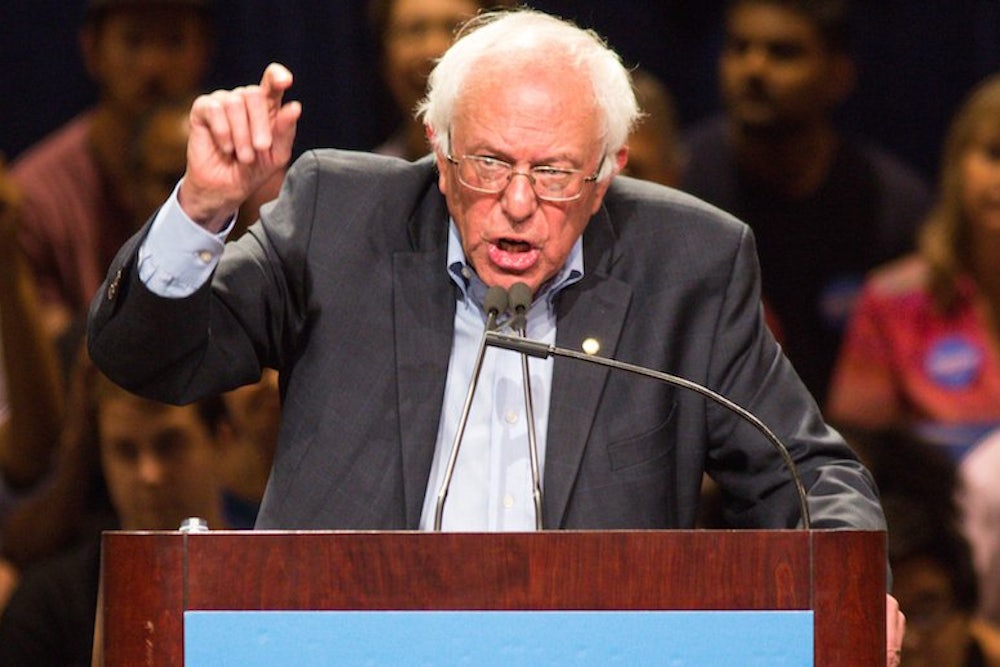Bernie Sanders should be everything environmentalists want in a presidential candidate. When the senator from Vermont announced his 2016 run, their longtime best friend on Capitol Hill looked like the perfect foil to push Hillary Clinton off the fence on contentious issues like the Keystone XL pipeline and Arctic drilling. Then, if his campaign picked up enough steam, he'd have the opportunity to expand the debate on green priorities beyond those big-ticket controversies.
That’s not exactly how things have turned out. Ahead of the first Democratic presidential debate on Tuesday, it's not even clear that Sanders still holds the high ground on climate issues, now that Clinton has adopted a more aggressive environmental stand on many of his signature issues. Sanders’ standard stump speech still frames climate change in stark terms—as “the single greatest threat facing the planet”—and his campaign announcement included a clarion call to “transform our energy system away from fossil fuels” toward energy efficiency and renewable energy. But he hasn’t matched this high-minded rhetoric with a broader agenda on fossil fuels and alternative energy. It's beginning to make environmentalists wonder: Is this really what we were waiting for?
R.L. Miller, founder of the Climate Hawks Vote PAC, ranked Sanders this spring as the top senator on climate change. But she says she hasn't seen Sanders' environmental passions reflected in the campaign. "The current iteration of his stump speech isn't pushing very hard on climate at all," she says. Miller and other activists remain convinced Sanders is as committed as ever to the cause, but as Grist's Ben Adler first noted, he’s only brought up climate issues mostly as applause lines. And in his high-profile September speech to evangelicals at Liberty University, Sanders disappointed environmentalists by never once mentioning climate. Equally disappointing, the senator has failed to connect environmental concerns to the broader themes of inequality he’s stressed in his campaign. Clinton has now even outpaced him with her ambitious proposals for expanding solar energy.
Sanders has pressed Clinton on only three main issues—the same three that initially gave him a strong advantage among environmentalists. From the beginning of his campaign, Sanders took a firm position against building the Keystone XL pipeline, Arctic drilling for oil, and President Barack Obama’s Trans-Pacific Partnership trade deal. “It is hard for me to understand how one can be concerned about climate change but not vigorously oppose the Keystone pipeline,” he said in July. He launched his campaign with climate activist and anti-Keystone leader Bill McKibben at his side, and by August, he'd earned an endorsement from the progressive environmental group, Friends of the Earth.
Since then, however, Clinton has deliberately taken each talking point away from Sanders. As secretary of state, she worked on both the Keystone review and TPP, but she's now staked herself out in opposition to both, and she's come out against Arctic exploration for oil and gas. Sanders has welcomed each announcement, while emphasizing that he's held these positions for years. And he has gotten some credit for nudging Clinton in the right direction; Dante Scala, a University of New Hampshire political scientist, is among those who've speculated that Sanders' rise gave Clinton the "incentive" to move left.
Sanders has thus far escaped some of the same scrutiny Clinton faced early on for not having a climate plan, back when she was still dodging questions on Keystone. He still has his long-running pro-climate record in the Senate to fall back on: He's floated bills to cut oil tax breaks, subsidize solar panels for millions of low-income homeowners, retrofit homes to become energy-efficient, and institute a carbon tax. But beyond the "big three" issues that he brought into the campaign, Sanders has surprisingly little to offer when it comes to implementing an aggressive clean energy agenda or limiting the exploitation of fossil fuels. Sanders has long opposed fracking for gas—another hot issue—but he hasn’t discussed it of late.
Environmentalists are clamoring for clear and ambitious renewable-energy goals. NextGen Climate Action, Democratic megadonor Tom Steyer’s super PAC, has asked the candidates for a plan to make 50 percent of electricity carbon-free by 2030. Clinton has met the target with her plan to expand solar and alternative forms of energy to 33 percent of electricity by 2027, which she offered in August; her plan reaches 50 percent when nuclear energy is factored in. “We have not yet seen a detailed plan from the Sanders campaign,” a NextGen spokesman says. In July, Clinton also came forward with an outline for achieving a 700 percent increase in solar capacity to power 25 million homes by 2027—another proposal Sanders hasn't quite matched.
Sanders is missing a chance to advance the debate on limiting fossil-fuel extraction. Clinton has said only that production should continue “until we got the alternatives in place”—hardly what climate activists want to hear. “Ending fossil fuel leasing on public lands is an absolutely essential box for any Presidential candidate to check, if they want our movement's enthusiasm,” says Karthik Ganapathy, spokesperson for the climate group 350 Action. Greens expect him to be on their side of the issue, and yet he hasn't once addressed the issue publicly as part of his campaign.
The Sanders campaign did not respond to multiple requests for comment on whether it's planning to roll out a more detailed climate plan. If he ever releases one, it could easily be more aggressive than what Clinton has offered, given his past Senate leadership on the issue. Sanders has hinted that he wants to get into more specifics. “I think environmentalists deserve a debate so we could talk about how we move aggressively to transform our energy system away from fossil fuel,” he said in late August.
It's a debate that environmentalists desperately want. And they could be hearing it broadcast to the nation on Tuesday, if only their champion wasn't missing his opportunity.
